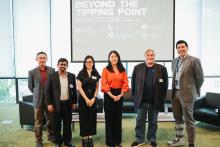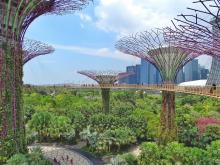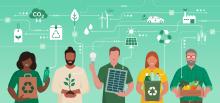This article is featured in Special Feature: Navigating Urban Sustainability.
Cities may well be economic powerhouses, but their growth has often come at the expense of nature. Paved landscapes and towering structures typically dominate urban spaces, leaving little room for the natural greenery, and this has made cities particularly vulnerable to the impacts of climate change - from heat stress to extreme weather events like flooding. In response to these challenges, the concept of 'regenerative cities' has emerged as a way to build urban resilience.
This article is featured in Special Feature: Raising Cities
A lower middle-class family is tasked with the upkeep of a new garden and street planting installation touted to provide environmental benefits to their city and local community. Instead of relaxing in their downtime, they spend hours on manual labour; weeding, watering and tending to the city’s much-celebrated “green infrastructure.” This was the case with a community in Los Angeles (LA), USA, found Sayd Randle, Assistant Professor of Urban Studies, in her paper “Ecosystem duties, green infrastructure, and environmental injustice in Los Angeles”.
The world is fast approaching its tipping point for climate change and current indications suggest this will happen sooner rather than later. A key target set in Paris in 2015 at the United Nations Climate Change Conference (COP21), aiming to limit the temperature increase to 1.5 degrees Celsius above pre-industrial levels, now seems like a pipe dream with scientists predicting that the limit will be reached in the 2030s.
Amid its diverse landscapes and cultures, Southeast Asian countries share a pressing environmental challenge - floods. Research by the ASEAN Risk Monitor and Disaster Management Review in 2020 showed that flooding is the most common disaster event in the region, with 13 percent of the ASEAN population exposed and USD 926 billion in capital stock at risk of damage.
An organisation can signal its commitment to sustainability through green certification and labels, or marketing campaigns with messages of environmental stewardship. However, according to Thomas Menkhoff, Professor of Organisational Behaviour & Human Resources and Dr Kevin Cheong, Adjunct Teaching Mentor at SMU, making bold statements and focusing solely on operational changes such as the eradication of single-use plastics is not enough to drive meaningful change.
At the 2015 UN Climate Change Conference (COP21) in Paris, world leaders agreed to work together to maintain global warming to no more than 1.5° C. Two targets were set in the Paris Agreement - achieving 45% reduction in emissions by 2030, and reaching net zero by 2050.
According to a December 2018 UN report on worldwide use of single-use plastics, 127 countries have “adopted some type of legislation to regulate plastic bags”. These include the 28 member states of the European Union, who last month voted to ban single-use plastic cutlery, straws, and cups by 2021.









